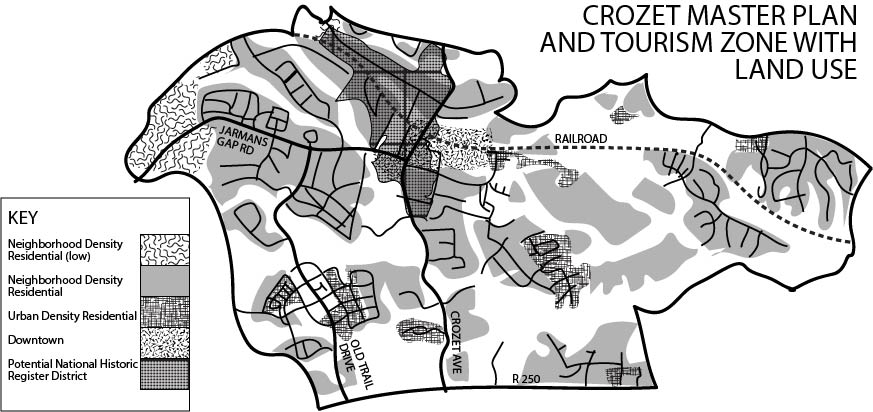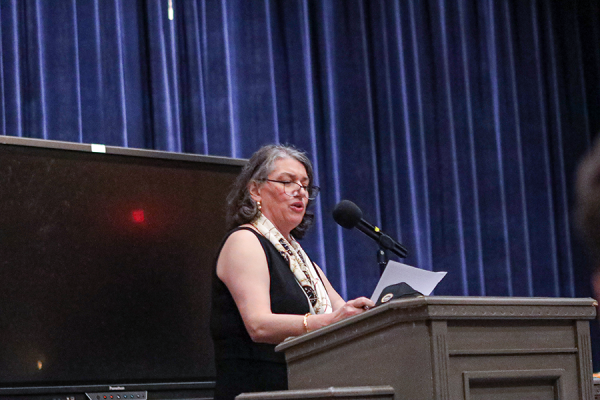There’s No Place Like Home
Crozet’s development habit can’t last forever
Credit: Julianne Kirby
March 13, 2020
My childhood lines up with the history of Crozet’s Master plan and population “boom”– my family moved into a new house in a small development in 2002. Since, I’ve watched the woods behind my house disappear into a thin strip of trees between two developments and Old Trail turn from a clear-cut swath of land to a collection of “villages”overflowing with thousands of units. It’s worth mentioning that there are generations of Crozet natives before me who felt that same sense of loss when my development popped up in their backyard.
With this population growth has come tension surrounding everything from infrastructure and the school system to speeding Western students on NextDoor. So what exactly should Crozet be? More importantly, why isn’t it hitting the mark? Everyone in town seems to have their own idea.
Here’s mine–simply give Crozet an identity outside of accommodating population growth. Rather, harken back to the aspects of Crozet that made people want to call it home in the first place. Make it profitable, too, so that we can bring in the money to support the new schools and roads that we desperately need while we’re at it. Crozet’s appeal does not lie solely in single-family homes on one acre lots, after all.
There’s only so much high-density zoned acreage to go around before developers can’t make a killing off of Crozet anymore, so I suggest that Crozet beefs up its tourism. I think it’s a surefire way to preserve our town’s roots as well as its profitability. The state and Albemarle County do too–or they seemed to.
In 2016, the County approved an ordinance creating the “Crozet Tourism Zone” drawn within the same lines as the Master Plan, pursuant to Virginia Code § 58.1-3851.1. This state code gives advantages to tourism-related development in these areas by providing “gap-financing.” This means that tourism-related projects that fall inside the state system of tourism zones will receive funding assistance from the state and tax rebates once they’re completed.
This distinction provides significant potential for developing tourism in our area. First of all, we are already rich with tourist attractions. Crozet has easy access to Shenandoah National Park and the Appalachian trail and a prolific brewery and winery industry. A 2007-2008 joint architectural research study of Crozet between the county, the Virginia Department of Historic Resources, and the Piedmont Environmental Council identified Crozet as a potential National Register Historic District.
There have been surprisingly few attempts to capitalize on this glaringly obvious opportunity to offer large benefits and incentives to tourism related development in our area. Among the state’s 71 other tourism zones, 61% “have established capital investment and job creation requirements” and 43% “offer fee reductions, waivers, or rebates” according to the Virginia Tourism Corporation. These tax reductions apply to a variety of areas, including business, real estate, and sales tax.
The Crozet Tourism Zone’s ordinance specifies no eligibility requirements or incentives. The only thing offered is “Marketing Assistance”–no concrete financial basis for even having this distinction at all. This strikes me as wasted opportunity, since we could be using the ordinance as a massive boost to Crozet’s identity and economy.
What to make of all this? It is easy to view Crozet as a gold mine of soon-to-be suburban development without much economic promise otherwise. However, there is untapped potential in embracing a local tourism industry that could strengthen our actual community, not just the potential to profit off of its land.
In amending the county’s ordinance to include specific requirements and benefits that would have a tangible effect on our community, Crozet could begin to grow its own economy and create our own jobs. A booming mini-tourism industry would give the actual community, not just wealthy developers, money and leverage in the local government.
This might give the county motivation to help us address the pressing infrastructure problems caused by our rapid population growth. Furthermore, it would incentivize preserving some of our local land and culture since it would be directly tied to profits that are based on existing appeal. Development isn’t evil, and neither is small-town growth. But it has begun to feel like Crozet’s identity is slipping between the cracks of imitation stone siding while we ignore the opportunity to embrace the elements of our town that give it long-term value.















